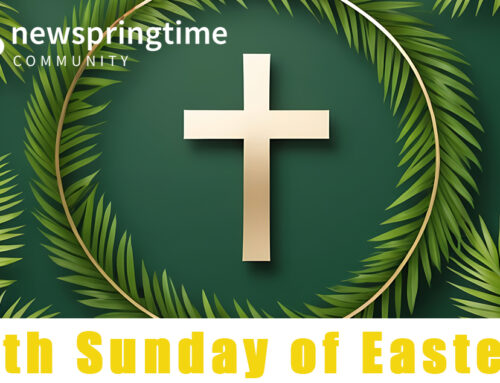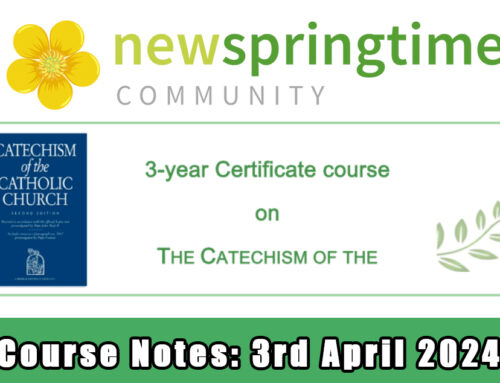The Catechism of the Catholic Church – 28th February 2024
To download The Catechism of the Catholic Church course notes for 28th Feb 2024, please click here
Commentary no 19.
References to the kingdom of God and the Church are frequent in the NT. In this commentary we will address two interrelated questions, firstly, what do the different references mean? and secondly, are they different ways of referring to the same reality, or are there differences between them?
Firstly, he phrase, “Kingdom of God” occurs 122 times in the New Testament. 90 of them came from the mouth of Jesus. The Kingdom is not a thing, it is not a geographical entity like a worldly kingdom. It is a person; it is Jesus. He led people to realize the overwhelming fact that in him God himself is present among us. St Paul wrote, “God’s Kingdom is not a matter of eating and drinking, but of the righteousness, peace, and joy which the Holy Spirit gives” (Rom 14:17). Origen a Church father echoed the words of Paul when he wrote, “those who pray for the coming of the Kingdom of God pray without any doubt for the Kingdom of God that they contain in themselves, and they pray that this kingdom might bear fruit and attain its fullness.” There is an “is” and “not yet” dimension to the kingdom. While it is already among us, it will only come to its complete fulfilment with the second coming of Jesus when the weeds of evil will be removed and there will be a new heavens and a new earth.
Secondly, speaking about the Church, the Second Vatican Council’s Dogmatic Constitution on the Church (Lumen Gentium) said, “The Church, constituted and organised as a society in the present world, subsists in the Catholic Church, which is governed by the successor of Peter and by the bishops in communion with him.” While separated brothers and sisters are not full members of the Catholic Church, Pope St Paul VI stated in his creed (Credo) that “we believe in one, holy, Catholic, and apostolic Church, built by Jesus Christ on that rock which is Peter,” while recognising “also the existence, outside the organism of the Church of Christ, of numerous elements of truth and sanctification.”
Ever since Vat II, the Church has expressed a passionate desire for greater union between the different Christian churches. As par 1 of the decree on ecumenism (Unitatis Redintegratio) stated, “The restoration of unity among all Christians is one of the principal concerns of the Second Vatican Council. Christ the Lord founded one Church and one Church only. . . . division openly contradicts the will of Christ, scandalises the world, and damages the holy cause of preaching the Gospel to every creature, (i.e., spreading the kingdom of God).”
Speaking about the members of other religions and even agnostics and atheists, the Church believes that who are dedicated to truth and love and try as best they can to live by their consciences are unbeknown to themselves living in the grace of God which comes to them in an anonymous way from the side of the crucified Lord through the Church as the sacrament of God’s presence in the world. As par 16 of the Constitution on the Church (Lumen Gentium) states, “Those also can attain to salvation, who through no fault of their own do not know the Gospel of Christ or His Church, yet sincerely seek God and moved by grace strive by their deeds to do His will as it is known to them through the dictates of conscience. Nor does Divine Providence deny the helps necessary for salvation to those who, without blame on their part, have not yet arrived at an explicit knowledge of God and with His grace strive to live a good life.”
On Good Friday we say two prayers.
Firstly, for non-Christians, “Almighty ever-living God, grant to those who do not confess Christ that, by walking before you with a sincere heart, they may find the truth and that we ourselves, being constant in mutual love and striving to understand more fully the mystery of your life, may be made more perfect witnesses to your love in the world. Through Christ our Lord. Amen.”
Secondly, there is a prayer for unbelievers, “Almighty ever-living God, who created all people to seek you always by desiring you and, by finding you, come to rest, grant, we pray, that, despite every harmful obstacle, all may recognise the signs of your fatherly love and the witness of the good works done by those who believe in you, and so in gladness confess you, the one true God and Father of our human race. Through Christ our Lord. Amen.”
It strikes me, that non-Christians and unbelievers of this kind are already, by the free gift of God’s grace, in the Kingdom of God, they are not full members of the Christian Church although it could be argued that they are related to it in a certain sense by baptism of desire.





